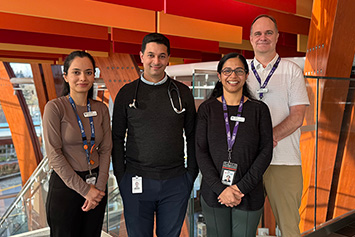
Home support clients in the Fraser Health and Vancouver Coastal Health regions will have their care directly managed and delivered by their health authority.
Vancouver and Surrey, BC – Home support clients in the Fraser Health and Vancouver Coastal Health regions will have their care directly managed and delivered by their health authority, as both shift to in-house delivery for the majority of the home support services they provide.
Home support helps people live independently in their home and be safe. For clients and their families it makes a real difference in people’s lives by bringing care to their doorsteps and supporting them to live at home and in their communities longer and safely. Government is improving home support and is making significant investment to achieve that goal. It is essential to any team-based strategy to improve everyday health for people everywhere in B.C.
This change is being made as the contracts with external service providers for home support services are set to expire in March 2020. The health authorities will not be renewing these contracts as they work with the Ministry of Health to prepare for new investments and enhancements in home support care.
Both Fraser Health and Vancouver Coastal Health have identified opportunities to better integrate services offered by the health authorities and their own teams of care providers, particularly given the rise in demand for home support services in their regions. They have determined that bringing the services in-house is the best way to leverage these opportunities and provide more consistent and coordinated care.
Making the transition to an in-house model has many advantages, including improved coordination of care for our seniors and the ability to better track and manage a complex service delivery model to ensure effective and efficient care. It allows for the opportunity to create integrated teams where staff interacting with clients are connected, can work collaboratively to meet the clients’ needs, spend less time traveling, and increase flexibility for employees. Most importantly, this model provides the reliability, quality, and continuity of care that many clients and families in our regions depend on, building a strong foundation so we can continue to support their needs today, tomorrow, and in the future.
These changes also follow audits of contracted home support providers, both for-profit and not for profit, which were undertaken last summer to the end of last year by Fraser Health and Vancouver Coastal Health. The audits looked at varying periods of time from 2014-2017 depending on the contracted provider. Health authorities have accountability for prudent management of their resources and where issues come forward, they have a responsibility to address them. Both health authorities are now reviewing these issues with their respective contracted providers.
To provide oversight and guide the process of moving home support services in-house, the Ministry of Health has appointed Lynn Stevenson, the ministry’s former associate deputy minister of health services. Stevenson will work with the health authority CEOs and monitor the transition to help guide and share information between the health authorities and the ministry.
“Living a healthy, independent life at home is important to people in our region who access our home support services, which is why we are working with government to improve the way we deliver this care,” said Dr. Victoria Lee, president and CEO of Fraser Health. “We believe making this thoughtful and deliberate change will result in better services for our clients and better experiences for our employees.”
“This transition will create an excellent opportunity for our health authorities to form integrated teams to improve patient care, enhance service coordination, and better align home support with the provincial vision of more team-based and connected community and primary care systems,” said Mary Ackenhusen, president and CEO of Vancouver Coastal Health.
Each health authority will be working with their contracted providers over the next 12 months on a plan to transition home support services in-house. During this time, the priority will be to ensure a seamless transition for home support clients—providing a high level of care and continuity, as well as maintaining client satisfaction. The health authorities intend to collaborate with their contracted providers to develop plans for transitioning employment opportunities for any active unionized staff who may be affected by the transition. The health authorities will also be meeting with impacted workers and their unions to ensure they are fully engaged and informed about the transition plans.
Both Fraser Health and Vancouver Coastal Health will continue to support and communicate with clients and their families to make sure any questions or concerns are addressed. Contracted providers for both health authorities have been informed of the decision.
Quick Facts:
- Home support is provided by community health workers who visit a client’s home to provide assistance with daily living activities such as bathing, dressing and grooming and other care needs as well as support and relief for a client’s primary caregiver.
- In the communities represented by Fraser Health and Vancouver Coastal Health, over 24,500 people receive home support services annually, representing over five million hours of home support services a year.
- Fraser Health currently provides 37 per cent of home support services in-house, and will move to approximately 90 per cent, beginning that transition in the coming weeks with targeted completion in the next 12 months.
- Vancouver Coastal Health currently provides 26 per cent of home support services in-house, and it will also move to approximately 90 per cent over the next 12 to 18 months.
For media inquiries, please contact:
Media line: 604-613-0794
media@fraserhealth.ca
Vancouver Coastal Health
Gavin Wilson
604-708-5312
gavin.wilson@vcha.ca


